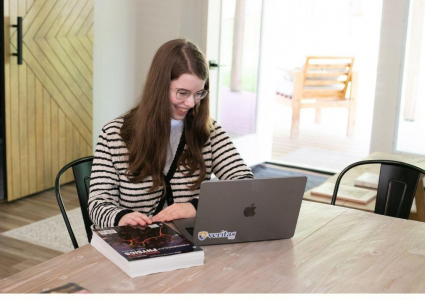Can the critical elements of a classical, Christian education be presented through a computer?

One phrase older Christians learn not to say is, “I will never do X work! That’s just not something I can see myself doing.” The Father seems to find it amusing to hear us say things like that since He then frequently leads us directly into doing X work. And, even stranger, we find ourselves loving the work of doing X!
My ‘X’ was that I would never teach online classes. It just wasn’t something I could see myself doing. To be fair, after 36 years of teaching in a ‘bricks and mortar’ classical school, I don’t think I was being presumptuous in my expectations. Yet, here I am in 2021 with three years of teaching online under my belt and, yes, loving it! But, I have to admit I had to overcome some biases. That, plus learning to manage the tech taught me to appreciate the benefits and community found in online classical education. I hope describing my experience might bless and inform others in the classical Christian realm.
As yet another example of how God likes to use the least qualified people to accomplish His purposes, in 1981 I found myself helping to start Logos School in Moscow, Idaho. Instead of teaching art at the secondary level in some public school (my original plan), I wound up serving as the Logos School superintendent for 35 years (where I also taught history and art). Logos served as Doug Wilson’s primary example of the value and purpose of classical and Christian education in his book, Recovering the Lost Tools of Learning (1991). The book made quite a national splash, resulting in, among other things, the formation of the Association of Classical, Christian Schools (ACCS) in 1993. Marlin and Laurie Detweiler came to the first ACCS Conference at Logos where Marlin became one of the four founding board members of ACCS.
Marlin and I became friends while we both served on the national board for over twenty years. I was impressed by Marlin and Laurie’s entrepreneurial ideas and work, based on biblical convictions as they helped form two classical schools, start Veritas Press and finally Veritas Scholars Academy (VSA), an online classical, Christian school which grew in size and scope rapidly.
Shortly after retiring from Logos in 2017, I was contacted by Dr. Bob Cannon, the Headmaster VSA, and offered the position of Dean of Academics. What made this offer even more attractive was that I would get to teach several art studios, too. But, true confession time, I had to overcome my unexamined bias: How could virtual be even a close second compared to the quality of teaching in physical classes? Even more, how could a ‘true’ classical education be done online? For years I had this mental picture of sad, pale and socially odd kids sitting in a dark basement or a cluttered bedroom, staring at the cold glow of a computer screen all their waking hours their lives being similar to the crippled woman in Wyeth’s Christina’s World.
So, can the critical elements of a classical, Christian education be presented through a computer? Before I answer that question and reveal what I discovered, here is a short list of those elements:
1. Pedagogy (ways we teach) - consciously and effectively use teaching methods that take advantage of the characteristics/frames of the students;
2. Understand the historical value and purpose of the Trivium (Grammar, Logic, Rhetoric), and make curricular choices that articulate the benefits of those levels;
3. Identify and use historically significant, primary documents and languages (e.g. Greek and Latin), many of them from the classical period of the Western world;
4. Ground and integrate all instruction and content in the truth of Scripture, clearly acknowledging Christ as Lord of all;
5. Implement the key essentials and absolute nature of truth, goodness and beauty.
Back to the million-dollar question: can all that really be done on a computer? Well, yes it can, is the short answer!
But how does it work?
Grammar - Our live classes start in third grade and pretty much any activity (short of sharing snacks) done in physical grammar classrooms can be done online, e.g. jingles, chants, songs, sound-offs, even hand motions in Latin or other subjects. With webcams, we can see the students' faces very well and hear their pronunciations in oral reading. The platform we use allows teachers to ‘send’ the students into Breakout Rooms (BORs), where they can work in smaller groups, interacting with each other on webcam. The teacher can visit each BOR to monitor the kids’ work (picture a teacher walking around the room). The virtual site also makes bringing in music, photos, maps, or short videos to use in the classroom as easy as clicking on the right link. How about using hand-held whiteboards? Yup, we do that, too; a child (or children) may draw on the room’s whiteboard(s), while at home the rest of the children write their answers and then show their work on their webcams.
The kids can’t go out to recess together, but they still feel and are very connected through the classroom.
Logic - What about the students who love to argue, or to talk a lot, or want to know ‘why’ this material matters anyway? In other words what about students in the Logic stage?
As to sheer communication opportunities (and encouragement), it’s hard to beat the Chat Box in every classroom. It’s exactly what it sounds like a box in a corner of the screen where the students (and the teacher) can type to talk to each other. Keep in mind the average young teen today can text, just using their thumbs, at 120 words a minute! Ok, I just made that up, but they ARE fast at typing. Combined with the Participation list of students in the room, an observant teacher can easily keep track of not only who is answering but also who is NOT answering. Candidly this is one of the points I stress with the teachers during my observations of them not to let a half-dozen kids in a class of 20 do all the talking in the chatbox. ALL the students need to be addressed and encouraged to speak during the class. To be fair, though, this happens in physical classes as well you know, the ‘front row’ syndrome.
What else can be done to leverage the frames of these pert students? Well, Socratic questioning can be done in any context, as can use anticipatory questions or, along with those, what about a series of powerpoint slides of intriguing images? All done without having to set up a projector and screen! How about competitions, games? Students in this stage love to compete so we bring in a virtual game, similar to Trivial Pursuit, called Kahoots, which can be loaded with applicable questions by the teacher ahead of time. Teams are easy to construct and points noted on the board. And the timer can be seen by everyone! Or how about planned discussions or disputations? A portion of the class comes on webcam to address the topic in a specified manner, while the other students observe and take notes of the points made (or blown). Even short dramatic readings, presentations, and enactments can be done, once again on webcams.
Hopefully, you can start seeing other possibilities for these pert kids.
Rhetoric- Then we get to the highest, the most intellectually challenging level the Rhetoric or Poetic. Why is this a challenge? These students are not only usually very tech-savvy, they can be, like most older teens, rather self-absorbed. At the same time, they want to be treated with respect and given real work, not just exercises, to do. They are old enough to know and even recognize there are usually at least two sides to a story. So biblical worldview discussions and even debates can and should be conducted. With these kids, it can be tough to keep up with their chat box comments, unless you set some ground rules for that interaction, just as you would in a physical classroom not letting the talkers dominate the discussion. Here again, the tools with the virtual classroom: webcams, BORs, multiple whiteboards, powerpoint slides, maps, short videos and quick access to the internet can be wisely employed to enhance activities and make the most of the class time. Oral and visual presentations, planned (and graded) discussions, short versions of Mock Trial, dramatic readings, small group work and then presentations, even biology class dissections, where they can see everyone else’s work, too. (I find this a delightful benefit in my art studios.) Impromptu speeches can not only be timed accurately, students can sometimes select a virtual background (like the Capitol Building or the Pyramids) to add ethos to their webcam speeches. Oh yes, and since these kids have immediate access to Google, either on their computers or their phones, there is very little time lost trying to recall or research facts, figures, and events.
Now, we will look at the real kids, parents, and teachers we have!
Remember that mental image I described previously of the mythical home-schooled kids, i.e. sort of young versions of Neo in the beginning of The Matrix? Well, the reality is far from that warped view. I should have known that, of course, but it still came as a very pleasant surprise. Online schools don’t have the corner on nerdy kids per capita it’s about the same as in physical schools. And even the nerds are some of the most loveable and often the most tech-wise, helpful kids.
The reality of the difference in context (physical vs online) struck me about half way through my first year with VSA: instead of ‘inviting’ these students to drive to a physical school and classroom, our families are inviting me (and all their other teachers) into their homes. I get to literally see where and how they live, to some degree. And, yeah, that means little brothers or sisters wander by, or more often, a cat or dog shows up on webcam. I have been invited into students’ homes in Brazil, Canada, Dominican Republic, China, London, numerous states, including Michigan’s Upper Peninsula, to name a few.
Plus, the kids get to know and like their classmates, just like in physical rooms. They comment on each other’s art works, usually encouragingly. In short, they love to socialize and will do so through the classes, just like in physical classes. As with physical schools, we get to know the students far better than we know their parents for obvious reasons. I do miss seeing and chatting with parents before and after school, during Back-to-School Nights and extracurricular events. But there are ways to regularly communicate with the parents through frequent updates to the course page, sort of like weekly news from the classroom. Then of course there are parent group emails, or just individual contacts for various reasons.
Another tremendous blessing of online classical ed for the parents is that it is literally much closer to home. I have seen quite a few moms, and some dads, in the background during my art classes. They don’t usually pop in (as I might be tempted to), but they are seeing first-hand what is happening in their child’s class, while it happens. But what about when the parents are not physically there? Well, every class is recorded as an archive. This is so that if kids miss a class, they can view it anyway (a major plus), but obviously the parents can do the same thing. As a former school administrator, I can assure you there were numerous times I sincerely wished we had had a camera in a classroom. Imagine how that would change the ‘child said’ vs the ‘teacher said’ situations... Yeah, at VSA we don’t have too many of those issues. The archives give a level of accountability that benefits both the parents and the teachers.
What about the quality of the teachers? Here too, I had unfair and ungrounded assumptions about the people that teach online classes. I may not be alone in the prejudice I had; I often assumed that these were people who were not able to get a job at a “real” school. Isn’t that awful? I had no experience or knowledge to support that view. In my new job I started not only working with the VSA teachers as an evaluator, but I have been in on many applicant interviews (online, of course). To say I’ve had my bias blown away would be an understatement! These teachers are of a very high caliber. And, as Marlin Detweiler often states, we seek world-class teachers and we seek them from literally around the world. We have quite a few amazing science teachers, for instance, who are moms with little ones at home. They can teach a few classes and never have to use daycare or drive across town to a school building. So we get their skills and knowledge and also support their convictions to be at home.
Just like the students, we have teachers working from all around the world, bringing not only their knowledge of their discipline, but also introducing their students to some fantastic cultural aspects.
My main job at VSA is to observe and evaluate these teachers at least five times a year, so I get to see them in action quite a bit. However, unlike the many observations I did at Logos, at VSA I’m invisible and can see the entire class time, if I want, by using the archives. I have come to greatly appreciate the collegial fellowship as believers and peers these teachers express. The ‘staff room’, the Faculty Group page, is always full of notes of encouragement or asking for prayer or seeking tech or pedagogical help. In other words, real teachers interacting positively!
Hopefully I have given you some idea of what classical Christian education can look like in an online context. The memorable blessings, as they do in all classical schools, come from working with our students and being able to point to Christ in every single class. The challenges, too, are pretty much the same as in physical schools, i.e. working with fallen humans as students with issues, as families who don’t always ‘get it’, as teachers who are not perfect and can make poor judgement calls.
The bottom line is this: it works! I love the new mental image I now have when I see the kids start filling the classroom. It’s a classroom without walls, bringing together students who are actually separated by thousands of miles, but seeing and hearing each other, and spending 90 minutes talking, laughing, praying and working as one class.
I’ve already confessed to you my prior prejudices, that is regarding online education as, at best, substandard. I now stand corrected in my views: when done well, as all our teaching should be, there is nothing to apologize for in doing it online. Instead, as the tech improves and more and more Christian families finally wake up to the disaster of the government schools, VSA and other online schools will be there, along with our physical sister classical schools to help those parents train up their children in the nurture and admonition of the Lord.







